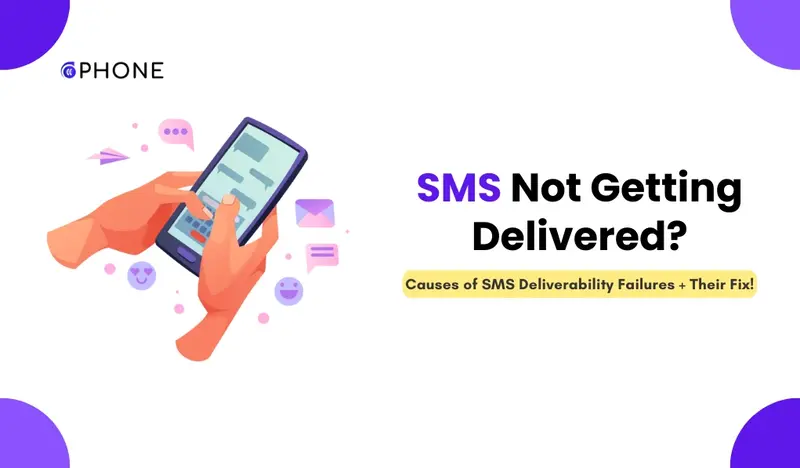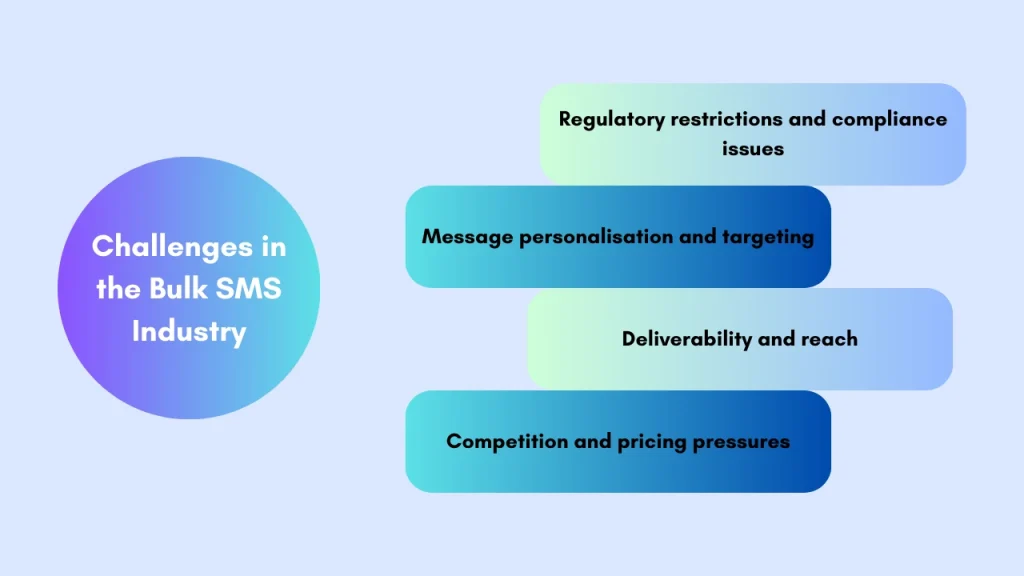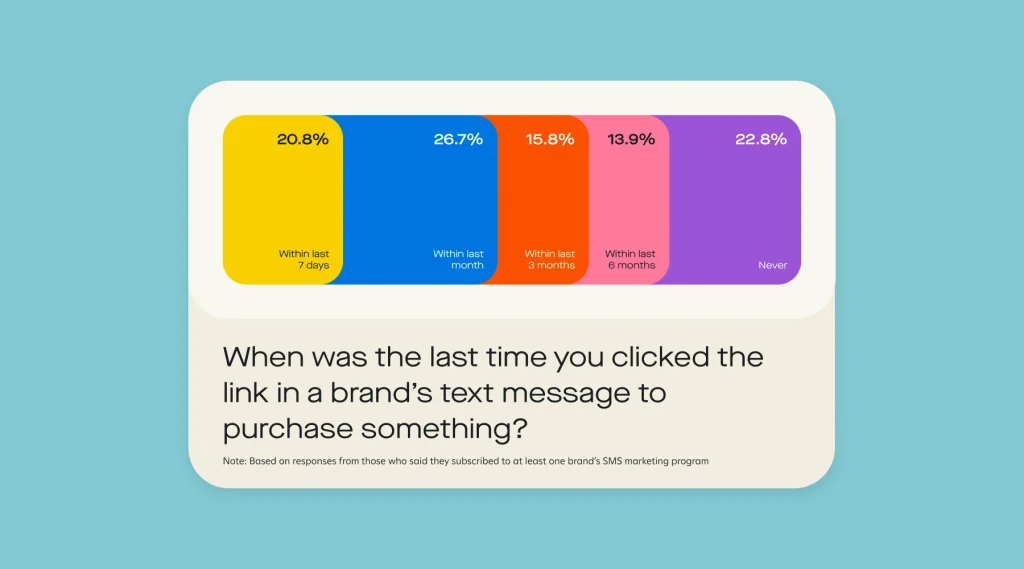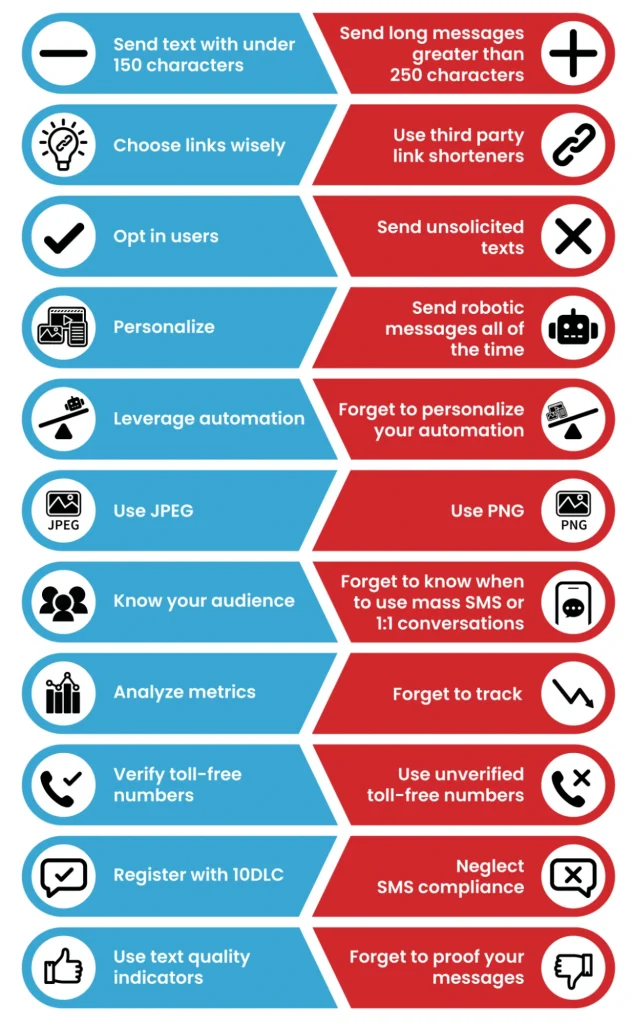7 Reasons Why SMS Delivery Fails and How to Fix It in 2025

SMS (Short Message Service) has been a longstanding core part of corporate communication and customer interaction.
With an open rate of over 98%, it is also a preferred channel for sending out alerts, promotions, reminders, two-factor authentication messages, and more.
But even with its reliability, businesses often face exasperating messages failing to deliver.
Such SMS delivery failures can result in lost opportunities, a bad customer experience, and decreased ROI.
In this blog, we focus on the common causes of SMS delivery failures and practical solutions, ensuring your SMS campaigns perform better. Let’s begin…
With an open rate of over 98%, it is also a preferred channel for sending out alerts, promotions, reminders, two-factor authentication messages, and more.
But even with its reliability, businesses often face exasperating messages failing to deliver.
Such SMS delivery failures can result in lost opportunities, a bad customer experience, and decreased ROI.
In this blog, we focus on the common causes of SMS delivery failures and practical solutions, ensuring your SMS campaigns perform better. Let’s begin…
Table of Contents:
What Is SMS Delivery?
SMS delivery refers to the process of sending a text message (SMS) from a sender (like a business or person) to a recipient’s mobile phone, and the message successfully reaching their phone.
In short:
👉 If the message is delivered, it means it reached the user’s device.
👉 If not, it could be blocked, delayed, or lost due to network issues or incorrect.
Why is successful SMS Delivery important?
In short:
👉 If the message is delivered, it means it reached the user’s device.
👉 If not, it could be blocked, delayed, or lost due to network issues or incorrect.
Why is successful SMS Delivery important?
- Guaranteeing the timely delivery of urgent alerts or updates
- Enhancing customer engagement and response rates
- Having a good brand reputation and trust
- Reliable delivery builds credibility
If your SMS campaigns experience low deliverability rates, there is a need to detect and correct the root causes.
Common Reasons For SMS Deliverability Failures
Knowing what causes SMS messages to fail will enable you to prevent them beforehand. Here are the most common reasons for failed SMS Delivery:

1. Incorrect or Invalid Phone Numbers
One of the simplest but most ignored issue is sending to invalid or wrong-numbered phones. These include:
- Typos in numbers
- Numbers not tied to active mobile devices
- Landline numbers that cannot receive SMS
💡Solution: Make phone number validation your first line of defense. Check if the number is real, active, and SMS-enabled, identify the line type (mobile vs landline), detect the carrier and location, ensuring region-specific compliance.
Tools like ClearoutPhone help clean and enrich your contact list by verifying number validity, line- type, and more, boosting your chances of successful delivery.
Tools like ClearoutPhone help clean and enrich your contact list by verifying number validity, line- type, and more, boosting your chances of successful delivery.
2. Network Issues and Carrier Problems
Even genuine numbers could suffer from delivery failure if the recipient's network is down, jammed, or experiencing technical difficulties.
💡Solution: Track delivery reports and attempt resending failed messages after a time delay. Use SMS providers with automatic retry facilities.
💡Solution: Track delivery reports and attempt resending failed messages after a time delay. Use SMS providers with automatic retry facilities.
3. Recipient's Device Settings
The message could fail to deliver if
- The recipient's phone is turned off
- It's in airplane mode
- It's out of network range
- Do Not Disturb (DND) mode is on
💡Solution: These issues are usually temporary. Most SMS platforms will queue the message and automatically attempt delivery once the phone is back online or reachable. No action is needed unless the phone remains unreachable for an extended period.
4. Message Content and Formatting

Messages containing suspicious content, links, or excessive symbol and uppercase usage can be flagged or filtered. Some carriers also filter messages containing:
- Shortened URLs
- Non-standard characters
- Spam-like messages
💡Solution: Maintain a clean, short, and pertinent message. Do not use spam words or excessive use of capital letters.
5. Spam Filtering and Carriers' Rules
Carriers tend to impose strict filtering features to discard spam or non-regulatory messages. If your message breaks such regulations, it might be dropped quietly.
Most usual reasons include:
Most usual reasons include:
- Sending large quantities of messages over a brief interval
- Unregistered sender IDs
- Non-compliance with opt-in/opt-out directives
💡Solution: Work with a reputable SMS gateway that guarantees compliance with local and carrier-specific laws. Use only verified sender IDs at all times.
6. Unverified Sender IDs
If your sender ID is not verified or registered, most networks will deny your messages to safeguard recipients against spoofing and spam.
💡Solution: Register your sender ID with carriers and utilize an alphanumeric sender name that can be identified by recipients.
💡Solution: Register your sender ID with carriers and utilize an alphanumeric sender name that can be identified by recipients.
7. Opt-Outs and Blacklisting
Users who opt-out of your messages or spam mark them might get placed on a blocklist to keep them from receiving future messages.
💡Solution: Always honor opt-outs and have an easy-to-use mechanism to let users opt-out. Periodically scrub your lists to stay away from hitting spam traps.
💡Solution: Always honor opt-outs and have an easy-to-use mechanism to let users opt-out. Periodically scrub your lists to stay away from hitting spam traps.
How To Fix SMS Delivery Issues

Solving SMS delivery problems involves a mix of technical devices, best practices, and regulatory needs. Here's what to do about them:
1. Check Phone Numbers Before Sending
Before you begin any sort of SMS campaign, it's very crucial to validate your contact database first. If you have an automated phone number validation software, it can detect invalid, inactive, or landline numbers which are unable to get SMS. It also normalizes formats according to international dialing codes (such as E.164), minimizing the risk of carrier rejection.
This upfront action not only enhances deliverability but also prevents your SMS credits from being wasted on unreachable numbers.
ClearOutPhone dominates in this feature by providing live verification and formatting, so that any contact in your list is ready to be sent a message.
This upfront action not only enhances deliverability but also prevents your SMS credits from being wasted on unreachable numbers.
ClearOutPhone dominates in this feature by providing live verification and formatting, so that any contact in your list is ready to be sent a message.
2. Track and Improve Message Content
Poorly designed messages are a major reason for delivery failure. Your SMS message content must stay compliant, brief, and interesting. Spam-triggering words such as ‘FREE’, ‘WIN’, or ‘URGENT’ should be avoided. Also, too much use of capital letters or symbols tends to get filtered.
Wherever it is possible, personalize messages by inserting the name of the recipient or appropriate information. This not only assists in evading spam filters but also increases engagement since the message comes across as more personal and real.
Wherever it is possible, personalize messages by inserting the name of the recipient or appropriate information. This not only assists in evading spam filters but also increases engagement since the message comes across as more personal and real.
3. Adhere to Carrier Compliance Requirements
The field of SMS marketing is a vigilantly monitored field, with compliance to legalities differing both geopolitically and carrier-wise. Hence, it becomes important to keep a strong eye on various regulations, like TCPA (Telephone Consumer Protection Act) in the US or GDPR (General Data Protection Regulation) in Europe, to prevent any sort of penalties or your messages being blocked.
Following are a few key compliance steps to take:
Following are a few key compliance steps to take:
- Get explicit opt-in consent before sending promotional messages
- Clearly state opt-out instructions (e.g., "Reply STOP to unsubscribe")
- Partner with SMS providers that are up to date on international messaging legislation
Prioritizing compliance safeguards not only your brand reputation, but also your delivery rate of messages.
4. Use Verified and Authorized Sender IDs
Having a verified and recognizable sender ID boosts the chances of message delivery as well as establishing trust with your audience. Register your sender ID with carriers whenever you plan to send out a campaign.
Shun constant changes to sender names because inconsistencies will baffle recipients and cause filtering. Select an ID that bestows your brand personality to ensure continuity across all messages.
Shun constant changes to sender names because inconsistencies will baffle recipients and cause filtering. Select an ID that bestows your brand personality to ensure continuity across all messages.
5. Clean and Refresh Contact Lists on a Regular Basis
Upgrading your SMS contact list to current status is as vital as the message. Regularly stripping numbers that habitually bounce or go inactive helps ensure that your outreach is being targeted at genuine, accessible users.
You can also optimize your list further by:
You can also optimize your list further by:
- Segmenting users based on history of interaction or engagement levels
- Regularly respecting opt-out requests
- Cross-checking against suppression lists in order to remain compliant
Having a clean list doesn't merely enhance deliverability- it also maximises ROI by targeting users with a higher likelihood of responding.
Advanced Strategies to Enhance SMS Performance
Beyond the basic fixes, you can implement these advanced tactics for even better SMS results:
1. Use SMS Analytics for Continuous Improvement
Track key metrics like:
- Delivery rates
- Open rates
- Response and click-through rates
Regular analysis can help you identify patterns, optimize timing, and improve message structure.
2. Integrate SMS With Other Channels
A multichannel approach boosts engagement. Consider combining SMS with:
- Email campaigns
- Push notifications
- WhatsApp or chatbots
Seamless integration can reinforce your message and ensure maximum visibility.
3. Localize and Personalize Your Campaigns
Send region-specific, language-relevant messages. Tailoring your SMS based on:
- Location
- Time zone
- Local events or offers
can drastically improve engagement and reduce opt-outs.
Additional Tips to Maximize Delivery and Engagement
1. Employ AI for the Best Timing
Artificial intelligence is a breakthrough in SMS marketing. AI algorithms can calculate the best time to send messages based on previous engagement behavior. Doesn’t matter if you are selling to early risers, mid-day shoppers, or evening surfers; AI can forecast user behavior from different demographics and schedule a message in accordance with when the recipients are most likely to respond.
This reduces the likelihood of messages going unnoticed or being buried and ensures your communication strikes at its most crucial—while providing maximum reach and responsiveness.
This reduces the likelihood of messages going unnoticed or being buried and ensures your communication strikes at its most crucial—while providing maximum reach and responsiveness.
2. Do A/B Testing for Campaign Optimization
A/B testing allows you to try different versions of your SMS campaigns and find out what actually performs with your audience. Whether you are A/B testing message text, CTAs, or sending times, little alterations can yield significant deliverability and engagement rate enhancements.
For example, you might find that a friendlier tone or more aggressive CTA performs better, or that messages during the morning hour provoke more responses than those at lunchtime. This monitoring enables continuous optimisation and more informed decision-making in the long run.
For example, you might find that a friendlier tone or more aggressive CTA performs better, or that messages during the morning hour provoke more responses than those at lunchtime. This monitoring enables continuous optimisation and more informed decision-making in the long run.
3. Work with a Solid SMS Gateway Partner
The base of any effective SMS campaign is a reliable gateway provider. Not all platforms are able to deliver in the same manner, so choosing one that can support high delivery rates, real-time reporting, and support for multiple regions is of utmost importance.
Look for providers that provide smooth integration with validation services so you can combine list hygiene and delivery tracking under one roof. This end-to-end solution simplifies your operation while maximizing campaign performance.
Look for providers that provide smooth integration with validation services so you can combine list hygiene and delivery tracking under one roof. This end-to-end solution simplifies your operation while maximizing campaign performance.
4. Train Your Staff in SMS Compliance and Decorum
Even the best-researched strategy can fail if your staff isn't on the same page. Make sure both your customer service and marketing teams are educated on SMS best practices, including:
- Regional laws and opt-in/opt-out policies
- Consent storage and collection policies
- Proper messaging frequency and tone
An educated team is less likely to make compliance mistakes and more likely to maintain a high standard of communication- both of which have direct impacts on deliverability and reputation.
Recap: Best Practices for Optimal SMS Deliverability
The following best practices are a must to maintain a decent SMS delivery rate:
- Segment your list: Personalisation increases response rates and decreases opt-outs.
- Steer clear of peak times: Send messages in off-peak hours to prevent network clogging.
- Work with delivery reports: Use these reports to make adjustments to your strategy.
- Engage your recipients: Get users to save your number to avoid spam filtering.
- Test before blasting: Send test messages to small audiences before full campaigns.
- Track feedback loops: See how users respond to your messages.
Final Tips and Takeaways
SMS is an effective channel- but only if your messages are delivered. By learning the most common reasons for SMS delivery failure and applying the solutions described above, you can significantly enhance your deliverability rates and optimize your campaign ROI.
From confirming phone numbers to content optimization and regulatory compliance, each action you take to enhance SMS deliverability is rewarded with increased customer interaction, enhanced brand credibility, and quantifiable business outcomes.
Begin auditing your SMS campaigns right now all while prioritising deliverability.
From confirming phone numbers to content optimization and regulatory compliance, each action you take to enhance SMS deliverability is rewarded with increased customer interaction, enhanced brand credibility, and quantifiable business outcomes.
Begin auditing your SMS campaigns right now all while prioritising deliverability.
FAQs
1. Why are my SMS not being sent?
Non deliverance of SMS can potentially be due to various reasons, like wrong phone numbers, unstable network conditions, blocked sender IDs, spam filters, or non-confirming content. Number validation, compliance, and clean formatting can help improve delivery.
2. How do I know whether an SMS was delivered?
The majority of SMS service providers provide delivery reports indicating if a message was delivered or failed. Reports contain timestamps and error codes where available.
3. Why is SMS delivery to valid numbers failing?
Valid numbers might experience delivery failure if the receiving phone is turned off, the number is listed on a DND list, the phone has weak signal, or if the message triggers carrier filters for having suspicious content.
4. How do you resolve SMS not delivered issues?
To resolve SMS delivery issues, you need to:
- Validate phone numbers prior to sending
- Utilize registered sender IDs
- Steer clear of spammy words or brief links
- Watch for delivery reports
- Select a trusted SMS gateway provider
5. What is SMS deliverability?
SMS deliverability is the capacity of a message to deliver successfully to a recipient's mobile device without filtering, dropping, or blocking by carriers or recipient device settings.
6. How do I optimize my SMS delivery rate?
You can optimize delivery rates by:
- Regularly cleaning your contact list
- Employing phone number validation services such as Clearout Phone
- Creating compliant and short texts
- Delivery at the best times for sending
- Minimizing excessive use of links and uppercase letters
7. Do SMS become blocked by spam filters such as email?
Yes, this is possible, as mobile operators deploy spam filters to filter messages that appear suspicious, contain prohibited keywords, or are sent from suspicious sources, like email spam filters.
8. What is a sender ID in SMS and why is it important?
A sender ID is the name or number which appears as belonging to the message sender. Employing a registered, known sender ID increases credibility and lessens the chance of your SMS being filtered out.
9. Is SMS delivery possible to guarantee?
No provider can provide a 100% guarantee, but you can optimize your opportunities through the use of verified numbers, compliant messaging, and a trustworthy SMS gateway.
10. What are some tools that can address SMS delivery issues?
Tools such as Clearout Phone assist through real-time validation of numbers, determining unreachable numbers, and formatting them properly- minimizing delivery failures to a great extent.
Search
Recent Posts
- How to Integrate AI into Your SMS Marketing Campaigns in 2026 January 30, 2026
- 15 Ready-to-Use SMS Templates That Actually Convert in 2026 December 11, 2025
- Boost SMS Marketing with Carrier & Line-Type Segmentation November 27, 2025
- 7 Proven Ways to Reduce SMS Marketing Costs and Boost ROI October 23, 2025
- 5 Best SMS Marketing Platforms in 2025 (Our Top Picks) August 28, 2025
Phone Validation Service
Reach out to more real customers for your business
Create a free account with 100 credits
